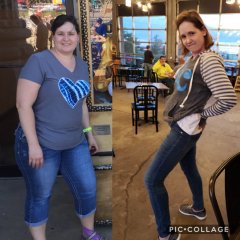Search the Community
Showing results for 'weight gain'.
Found 17,501 results
-
I haven't heard this before about the four years. As I understand it, a smaller stomach produces less of the "hunger hormone" ghrelin, which is what signals to the brain that the stomach is empty and we need to eat. But I've never heard that they grow back. I thought as long as we didn't overeat and stretch our stomach, we'd be ok. I'm quite happy with not being hungry all the time, and I don't want to go back to the way I was. Anyhow, I'm finally at BMI 29, which is something. We've lost almost the same amount of weight, 22 kilos. I sincerely hope I will lose two kilos in February and each coming month, and not just one like in January. I still have 16 kilos to go, and it will take more than a year still at the rate of one kilo per month.
-
I recently started supplementing my daily cardio with weight training - I am seeing a personal trainer now two mornings a week, I noticed in the personal trainer sessions I’m getting lightheaded. I don’t experience the same lightheadedness during intensive (Zone 4-5) swim or other cardio workouts. Im pretty confident this lightheadedness is an issue of properly fueling myself for a weight training workout. THE ASK: I’m looking for suggestions of what I can eat in the morning ahead of training to better fuel myself to prevent lightheadedness . Secondarily I’m also generally interested in what you all eat prior to workouts. - My current routine includes a Premier Protein and a protein2O energy at 75 mins and 30 mins before a workout as well as at least 8oz Water. - I’m 2 months post-sleeve and my nutrition plan at this stage allows only the following in addition to our protein: 1 serving of fruit and 2 servings of non-root vegetables. Additional background: Before you suggest the below I’m already aware of, actively monitoring, and confident these things are not to blame: - Im well rested -it’s rare I don’t hit 8.5hrs/night. - I’m getting easily over 72oz of hydration daily - I’m averaging between 80-100 protein/day. - I was active before my surgery and have worked with trainers and weight training extensively in the past - the work I’m doing is not new to me. For example in the year before surgery I’ve deadlifted over 250lbs. **** I’ve also reached out to my nutrition team with this query but was interested especially in hearing from anyone else who has experienced and overcame this.****
-
Hello my forum friend, Will you allow me tell you that you are not failing. You have lost a ton of weight and have done so well. You have hit a bump in the road, we cant be perfect 24/7. You have done almost a year of total dedication to the plan and are having a little time out. You haven't done anything too out off control and you know you want to progress further. Go shopping with a list of foods you need for a healthy diet. Get rid of the bad food, it doesn't make you strong. Do one meal at a time and progress to a day, you have the tool to do this even when the pill goes against you. Hormones stink. Don't struggle alone.
-
I am sucking.. bad. I had a BC control change and it is the only thing I can think of that has changed. I ALWAYS want to eat, I am a miserable b***h right now. Don't want to be around anyone, just want to sit on the couch and eat. Which is basically what got me here int he first place. I haven't gained weight, but I haven't lost anything in over 2 months. I know it is because I am eating more, sometimes bad crap. I am really thinking about switching back to my old BC to see if it helps get me out of the rut! I still want to loose 40 more lbs to hit my goal and this isn't going to get me there...
-


Weirdest None-Scale-Victory - I'll go first
Flapjack71 replied to chiquitatummy's topic in General Weight Loss Surgery Discussions
I thought of another… The elevator at work used to jump up an inch to accommodate my weight when I stepped on. No more. 😃 -


Bariatric podcasts???
KCgirl061 replied to ryan_86's topic in General Weight Loss Surgery Discussions
I wish I had a good one for you, I enjoy listening to podcasts too and would love to find a motivational weight loss one. I did listen to some of Our Sleeved Life. The only reason I struggled continuing to listen ( and this is kinda dumb, and nothing the hosts could control) was because their voices sounded too similar! I couldnt tell who was who! -


Scheduled And Insurance Denial
lisacace replied to DTB583's topic in PRE-Operation Weight Loss Surgery Q&A
This happened to me. Did all the testing day prior to surg cancel insurance denial And I did 3 appeals and lost I had proof of weight watchers. Diet pills etc. they wouldn’t take. I have Cigna. 2/10 I am leaving for Mexico ! I have no choice -


Sleeve revision to bypass 2/6.
shriner37 replied to nicholeweller's topic in Gastric Bypass Surgery Forums
Best of luck with your revision surgery! I did the same thing for the same reasons a year ago. My biggest issue was a hiatal hernia that had caused great pain and difficulty eating. I also had pretty bad reflux. It seemed like recovery was about the same the second time around, although I was seven years older. I did not lose as much weight after the bypass, but probably because I didn't have nearly as much to lose. As has been said, be careful to chew thoroughly and you still might find some foods that cause you challenges for a while. Just go slowly and if something causes issues wait a while before trying it again. The pouch does react differently than the sleeve and it takes a while to learn how to deal with it. Two things that you may or may not experience after the bypass are dumping syndrome (your body reacting to sugars) or reactive hypoglycemia or late dumping (your body overproducing insulin in response to a meal). I was lucky not to experience dumping but do have issues with the reactive hypoglycemia. I noticed that I lost weight for about 3 months after the revision, then stopped. One difference for me this time is that if I gain weight it seems to stay around, where often times with the sleeve I would gain a couple pounds then lose them easily. Not sure whether this means that my metabolism wants to be at a higher set point weight. I didn't really do the revision to lose weight, and I'm still 15-20 pounds lower than when I had the revision, but it is something I've noticed. Also, my experience is that although the surgery helped tremendously with reflux, for me it's still not gone completely. I'm still taking omeprazole daily, and if I eat certain things in the evening I might still have a reflux issue late at night. I can completely control this by not snacking at night. -

Body contouring recovery time
ksgypsy replied to ClareLynn's topic in Plastic & Reconstructive Surgery
I had a lower body lift, arm lift and breast revision on January 25, 2023. My Surgeon implants a pain pump (a medical device he invented) in the abdominal area that lasts about 3 days after surgery so I really had much less pain than anticipated. I feel pretty good so I constantly have to remind myself not to do too much and jeopardize my recovery. My main area of soreness are my arms. The itching is the most difficult issue I'm having. My Plastic Surgeon, Dr. John LoMonaco in Houston, TX, co-wrote a book on plastic surgery specifically for bariatric patients. "Bariatric Plastic Surgery: A Guide to Cosmetic Surgery after Weight Loss". I found it on Amazon/Thrift Books and it's a great resource! If you're researching Surgeons, I highly suggest you check him out. He is a truly gifted Surgeon who specializes in Bariatric Patients, and in addition is an excellent human being! Best of Luck! -
From the album: Progress pictures
© Mine
-


September surgery buddies!!
Hope4NewMe replied to Slwhurst's topic in PRE-Operation Weight Loss Surgery Q&A
We should have a whole year and even more to reach our goal. Everyone is different so its sad if your surgeon put that stress on you to do it extra fast. As long as your weight is not going up and still trending down then you are doing great. No idea why they would expect you to reach a certain weight by a certain date. Hugs! -


Any Feb surgery peeps out there?
ynotiniowa replied to Teresa Eschenbaum's topic in Gastric Bypass Surgery Forums
Well I'm 4 days post op! Zero issues with hydration and protein. 80 0z liquids so far today and 65 grams of protein. Never had "sharp pain" but felt like I had an ab workout from hell that I'm still trying to get over the soreness lol. No nausea. No diarrhea. No leaks. No complications. Had surgery at 10 am the 1st and headed home around 9am the next morning. No issues with my chewable vitamins. No horror stories of gad pains from the lapo. Was belching day of surgery, passing gas by day 3, first BM day 4. Taking miralax each morning, mixed w Gatorade zero. Taking just Tylenol, still have two "pain pills" just in case. Drove my car today! No temp or taste issues. I feel super grateful my luck so far! Down 11.6 lbs but I'm assuming IV fluids weight is alot of that number. I have 6 incisions like the first photo. The bruised one is the one they place the stapler through. Sent from my SM-F721U using BariatricPal mobile app -
Stick to your pre-op diet best possible. It might be hard, but after surgery all those cravings go away really quickly. Weight loss feels controlled, stable, and predictable. The first week I was tired and had discomfort from gas in my body cavity that felt intense but was gone at the end of week. I spent much on the first week in bed resting. The second week post surgery was my stomach acid week I’d wake up at 5am and feel like I had a belly full of acid. Not super painful, just annoying and that symptom went away at the end of week two. I was back to work and up and about week 2 but sleep early or naps in the afternoon. Week 3 is when my progress allowed me to move on the soft Proteins. What was most noticeable this week is that occasionally I would get extremely dizzy with the room spinning. I realized this was due to seasonings or Condiments with minimal sugars but the first sugars I had experienced since surgery. Those first 2-3 grams of sugar /food iwould cause my my insulin to over compensate and my blood sugar would drop real low. That happened for about a week and a half 1-2 times a day and then my body adjusted and I haven’t experienced it since. I also experienced a bit of nausea at this time as I tried new foods and learned to slow down eating but never have actually threwup. I’m two months out now. Only remaining symptom is light fatigue and occasional nausea as a reaction to eating something new or eating to fast. But it’s super tolerable and not as bad as it might sound. ALL OF THIS TO SAY: some of the initial symptoms may seem miserable or annoying in the moment while your body is adjusting to your surgery, but understand most of them will pass in a week or so they aren’t there for the long term. Be kind to yourself, allow yourself to rest, and focus on your Protein and hydration above all else. You got this!
-


A lot of scary information
BigSue replied to LindsayT's topic in General Weight Loss Surgery Discussions
When I was considering weight loss surgery, I specifically looked for people who regretted it. I always like to be prepared, and for me, it was important to know the good, the bad, and the ugly. I had a hard time finding people who regretted their surgery; even people who suffered from serious complications often said that they would still do it again! I think it's important to go into surgery with your eyes open. It's not fun or easy. There are pros and cons and you have to evaluate for yourself if the surgery is worth it. For me, it was pretty clear cut, and yet still a tough decision. I started with a BMI over 60. My weight seriously hindered every aspect of my life. It was worth it for me to take a chance, even knowing all the negatives and risks, because it felt like my only chance to live. I lost more weight than I ever thought possible, but it's a struggle every day -- and yet nothing compared to how hard it was to live with morbid obesity. -
I had a long 8 months to wait for this surgery and thought I was very prepared. I read this forum from back to front. 20 years worth of problems and advice. I didn't know it all though, I didn't know that hormones live in fat cells and when we loose a lot of weight quickly we had all these hormones rushing around our bodies like puberty on steroids. I was having a tough time of it with nausea and vomiting too. I cried for a week and did not know why. I asked for help on here and got it. The answer, too many hormones at a time when I was overwhelmed with trying to do everything right. I think you need anti nausea medication. So, You are not alone. Its normal to feel like you are. As you have realised its big surgery and now you have to get to grips with it, there is no going back. IT WILL GET BETTER. You wont have to chew food like this forever, it just helps your tiny stomach digest your food so that you get the nutrients from it. Your headaches could be from dehydration, its tough to get all the liquids and food in early on, it feels like it will never get better but it does. Just do your very best everyday to get your liquid and protein onboard. That way you will improve every day and doing that will improve your mental health a little Please seek counselling for your eating disorders, hopefully you can find one who understands bariatrics too. OR talk to us on here, you can rage, cry and get these feeling off your chest and it may help a little bit. We don't mind, the ones before us did the same for us. You are not alone
-
It does get better. It's normal to have regrets at your current stage. I am one of the very rare bariatric surgery patients to have serious complications. However, after a challenging year, I've lost a total of 115 lbs and my life is totally normal. I eat regular food and have resumed all of my prior activities. A year ago I was in hospital due to peritonitis and sepsis arising out of bariatric revision surgery. I rued my decision to have RNY>RNY revision surgery. I spent 7 weeks in hospital with 3 endoscopy procedures and two open surgeries, followed by 3 weeks in a rehab facility before returning home. I had an open surgical wound for another 3 months, requiring daily dressing changes. I'm lucky to have survived at all, with organs and limbs intact. Because of the endoscopy procedures my pouch and anastomosis were stretched so I now have minimal physical restriction and will have to watch my diet and record my intake for the rest of my life. I accept that and hope to lose more, but will be content if I don't continue to lose. If you read the many stories on this site you will see that regrets pass and the vast majority of us are ultimately happy with our decisions to have surgery. Life does return to normal. You will be able to eat normal food. If you follow an appropriate food plan and learn how to eat differently during this period of restriction you will lose weight and keep it off. Since you have had such meager support, it's up to you to read and learn more about how to make a successful return to normal life minus the excess poundage. There are many excellent books available. You may be able to get some on Amazon.de or have them sent to you by someone in the US (or on Kindle in English). Here are a few of the books I recommend. There are many other excellent books and cookbooks to support you. You may ultimately still need breast reduction surgery, but you will be in better shape before you proceed with it. In the meantime, make the most of the tool you have been provided. Hang in there. Day by day, it will get better.
-
I know with me my doctor felt the sleeve was the safest. I have many health issues and I'm not a spring chicken so to speak. Lol. He said he truly wanted to help me and knew the sleeve would be a success whereas the bypass..... I might not make it. No problem choosing for me. He's been a terrific Dr. Just got it done Feb 1st 2023. But we've been working towards this for over a year and a half. For me it's unusual to meet a Dr first time and not see judgement in their eyes because of your weight. His was just kindness. So when he told me in his opinion the sleeve was it, easy choice! Sent from my SM-S901U using BariatricPal mobile app
-
Oh this is great to hear! I will look into Zocdoc and go from there. I am hoping for the same results. Did you have to give 2yr weight history from cop or anything ?
-
I understand that you are feeling overwhelmed and regretful after your weight loss surgery. It sounds like you went through a difficult and confusing time both before and after the surgery, and it's understandable that you are feeling frustrated and sad about the experience. You mentioned several points in your message, and I'd like to address each one: Pre-surgery preparation: It sounds like you did not feel fully prepared for the surgery, both in terms of understanding the prerequisites and the potential physical and emotional effects of the surgery. This can be a common experience for people who undergo bariatric surgery, as the process can be complex and confusing. Hospital experience: The experience you had in the hospital sounds particularly challenging, with language barriers, physical discomfort, and a lack of support from the medical staff. This can be difficult to manage and can impact one's recovery and overall feelings about the surgery. Eating habits and diet: The changes in your eating habits and diet can be a significant adjustment, especially when combined with the physical side effects of the surgery. It's understandable that you are feeling frustrated with having to eat smaller portions and chew food thoroughly, as well as the headaches and nausea that come with eating. Mental and emotional impact: Your mention of having a history of eating disorders is important, as bariatric surgery can bring up old thoughts and feelings related to self-harm and negative self-talk. It's important to have a support system in place and to reach out for help if you need it. Overall, it's clear that you are going through a difficult time and that your experience with bariatric surgery has not been what you expected or hoped for. I would encourage you to reach out to your bariatric surgeon or a mental health professional for support and guidance. They can help you understand the physical and emotional changes you are experiencing and provide you with tools to manage them.
-
I had serious doubts about getting the gastric sleeve a few days before my surgery. I expressed them to my husband but he thought I was just nervous and wanted to support me, so he urged me to go through with it. I hate it though. I hate my life now and I'm not sure if I will ever not hate it. I have a couple close friends and they did not feel this way 4 weeks post-op like I do. I cry all the time. I'm worried something is wrong and terrified of having to go through any kind of revision surgery. I'm an American living in Germany and it is so difficult to contact my surgeons office and get anyone who speaks enough english to help me. I started my WL journey about 4 years ago when we were stationed in Italy. I was denied a medically necessary breast reduction because my BMI was too high. So I was referred for weight loss guidance.First, I was sent to the base nutritionist (a perfectly in shape airman) who told me I needed to work out more and eat more whole vegetables. I had to work with him for 1+ years before being able to try any WL medications. Unfortunately that was in early 2019, and we all know how the next few years went. We PCS'd to a new base in Germany in 2020 and when I asked about the WL medications I was told that was not an option here. They recommended I carry on with my (now virtual) nutritionist. I wasn't losing any weight and working out would send my back into spasms from my H cups breasts. I was taking a combination of Flexural, Motrin, and Valium for my back spasms, only using the Valium when they were at a level 8 or above pain level (so less than 1 valium a month). Turns out not only could I not get WL meds here, I also could not get a refill on my Valium. I had used too much (less than 1 pill a month for a year). So any weight training was immediately phased out of my working out, which now consisted of only walking. This past summer I went back and told them I really need a breast reduction and if I had to go the WLS route then I was open to that. The provider (who has had WLS themself) was very on board with WLS. I told them that I had already done the nutrition part at my previous base, so he put in the surgical consult referral right away. After I met with the surgeon, who surprise, surprise wanted to operate (surgeons always gonna surgeon), my provider put in the referral for my surgery and stated that all prerequisites had been completed at prior base. Then boom... endoscopy and surgery scheduled. Now all I had said was that I went to nutrition at my previous base and continued it virtually. So I had no idea what other preqs there could be. I had a few meeting with the nutritionist here about the gastric pre/post op diet. That's it. I learned about the full liquid to clear liquid pre-op and clear liquid to full liquid to purees to soft foods diet post op. I was completely unprepared mentally and emotionally for this surgery. Not to mention I had done all my pre-op nutrition with the American on base nutritionist and post-op was with the German hospital nutritionist. They had completely different guidelines (like the Germans wanted me to start soft solids on DAY 5 post op and stop protein shakes immediately). I was in the hospital for 4 days with nurses who spoke very little English, so they would give me shots and pills but never tell me what they were giving me. I know a small amount of German, enough to get by with running errands and what not, so I understood one nurse when after I told her my German was minimal and asked if she could speak English, she got annoyed with me and told me I was never going to be allowed to go home. The patient liaison from base sorted it out and the issue was the hospital nutritionist would not do my consult without an in person translator that I needed to provide and I could not be discharged without that consultation. I felt like I was drowning; I still feel like I'm barely able to tread water now at 4 weeks post-op. My end goal wasn't WL to be skinny. I just wanted a breast reduction. Before surgery I didn't have high blood pressure, diabetes, GERD, sleep apnea, high cholesterol...zero comorbidities. For all intents and purposes I was a healthy fat lady with giant boobs. So post surgery I was/am overwhelmed with regret. There's all these things I feel like I didn't know and wasn't prepared for. Like I knew I was going to be eating smaller portions, but didn't know about the tiny bites and chewing things until its mush in your mouth for the rest of your life. I didn't know that my stomach would be almost too swollen to drink water after surgery and that the german hospital only provided water and broth, no popsicles or jello. So I spent my days in the hospital feeling nauseous all the time because drinking water made me taste blood in my mouth and that made me gag, all while my nurse tisked me and told me I was never going home. No one asked if I had a history of eating disorders (which I do) and how this surgery and diet are going to bring up old thoughts and feelings of self harm and negative self talking. No one weighed out if the possible negative side effects of the surgery were stronger than the positives. Pre surgery I took ZERO daily meds other than a daily vitamin. Now I need an antacid and stool softener to be able to ingest anything other than water and not tear myself in half in the bathroom. I also need daily tylenol because eating anything gives me a massive headache. I don't even want to eat anymore. I spend 30 minutes forcing myself to take tiny bites of some high protein food and then I spend the next hour actively trying not to barf it back up. Without tylenol I am running at 99F, but when I eat it goes up to 100-101. The doctor said its not an emergency unless its 101.5, which is hasn't gotten to yet. And even if it did, what would I do?! The hospital was horrible. My hand still hurts from where the nurse wouldn't flush my IV, so the port go blocked and all he fluid and medicine soaked into the flesh of my hand, making it swell up like Wreck It Ralph. I had an allergic reaction that made me sneeze for days after surgery. No one would offer any help or advice about my sneezing. They told me to eat less, but I wasn't eating anything at all. I just hate this. I hate food. I hate eating. I hate the thought of chewing until something is a mushy paste. I hate life. I just wanted a breast reduction and now I feel like I've had a life reduction.
-


February 2023 surgery dates!
Erin18 replied to Erin18's topic in PRE-Operation Weight Loss Surgery Q&A
You will be fine! I haven't had surgery yet, but I did have weight loss surgery before. I had lapband and it had to be removed in 2013 due to an abscess to the surgery I had to put the band back in place. But the after surgery wasn't bad, get up and walk to make sure you don't get blood clots, they usually give a shot in the stomach that helps prevent blood clots as well. When I had surgery before, I was so tired, I slept, got up walked around the hall and used my phone or their TV and fell asleep and repeat. Later that night I had nausea and I had that for 2 and a half months. So if you tend to get nausea, ask for something for that before going into surgery that day and if you have nausea after surgery, they will give you some nausea medicine. Getting up and out of the bed was a little hard for me. I had someone help me out of the bed. Everyone is different. Some can get up easier than others. With lapband, I only had to stay over night. With bypass I'm staying 3 days. Your stomach/abdomen will be sore for about a week or so, depending. Bring a pillow for the ride home! It really helps with any bumps along the way home! Good luck! -


A lot of scary information
Alex Brecher replied to LindsayT's topic in General Weight Loss Surgery Discussions
Bariatric surgery can be a life-changing procedure for many people and can lead to significant weight loss and improved health. However, like any major surgery, it also comes with its own set of risks and challenges. It's understandable to have concerns and feel overwhelmed by the information you're reading online. However, it's important to keep in mind that not all experiences are the same and that many people have had positive outcomes from bariatric surgery. It's best to discuss your concerns with your bariatric surgeon and to ask questions about the procedure, the risks, and the recovery process. Your surgeon can provide you with personalized information and guidance based on your individual needs and medical history. Ultimately, the decision to have bariatric surgery is a personal one and should be based on a careful consideration of the benefits and risks, as well as a thorough discussion with your doctor. With the right support and preparation, many people are able to achieve their weight loss goals and improve their overall health. -
It can be challenging to work in an environment with a lot of junk food, especially when you're trying to change your eating habits. However, there are some steps you can take to make it easier: Plan ahead: Pack healthy meals and snacks to bring to work with you. This way, you'll have healthy options readily available when you feel hungry. Surround yourself with positive influences: Try to seek out coworkers who have similar goals and interests in healthy eating. Joining a weight loss support group or finding an accountability partner can also be helpful. Practice mindful eating: Take the time to sit down and enjoy your meals, rather than eating at your desk or on the go. Pay attention to the flavors, textures, and smells of your food, and savor each bite. Be prepared to say no: It's okay to decline junk food offerings from coworkers. Be polite but firm in your resolve to stick to your healthy eating plan. Avoid temptation: If there's a particular junk food item that you find especially tempting, try to avoid it altogether or limit your exposure to it. Stay positive: Remember why you're making these changes and focus on the benefits you'll experience, both in terms of your health and your weight loss goals. By making small changes and being proactive about your health, you can overcome the challenges of working in an environment with a lot of junk food and achieve your weight loss goals. Good luck!
-
It's good that you're taking a proactive approach to your health and seeking clarification from both your endoscopy doctor and your bariatric surgeon. Intestinal metaplasia is a condition in which normal cells in the stomach lining are replaced with cells that resemble those found in the small intestine. It can be a risk factor for developing stomach cancer, and it's important to monitor it closely. If your endoscopy doctor has recommended another endoscopy, it's a good idea to follow through with it. The procedure will allow your doctor to get a better look at your stomach lining and determine if there have been any changes since the previous endoscopy. In terms of bariatric surgery, it's important to discuss your specific case with your bariatric surgeon, who can provide you with the best guidance for your individual situation. They can also answer any questions or concerns you may have about the procedure and help you make an informed decision. If you have intestinal metaplasia, your bariatric surgeon may recommend a Roux-en-Y gastric bypass (RNY) instead of a sleeve gastrectomy. The RNY procedure involves rerouting the small intestine to a small pouch created from the stomach, which can help reduce the risk of developing stomach cancer. It's important to follow your doctor's recommendations and to discuss any concerns you may have with them. With the right care and support, you can achieve your weight loss goals and improve your overall health.
-
Weight stalls after bariatric surgery can be a common concern for some patients. The length of a weight stall can vary depending on several factors, including the type of bariatric procedure, the patient's diet and exercise habits, and individual metabolism. It's not uncommon for patients to experience a weight stall for a few weeks or even a few months after surgery. However, if you have been consistently following your post-operative diet and exercise plan and are still experiencing a weight stall, it may be helpful to speak with your bariatric team for further evaluation and guidance. Your bariatric team can help determine the cause of your weight stall and provide you with personalized recommendations to help get you back on track. This may include adjusting your diet, increasing physical activity, or making other changes to your lifestyle. Remember, weight loss after bariatric surgery is a gradual process, and it's important to be patient and persistent in your efforts to achieve your goals. With the right support and guidance, you can overcome any obstacles and reach your target weight.














